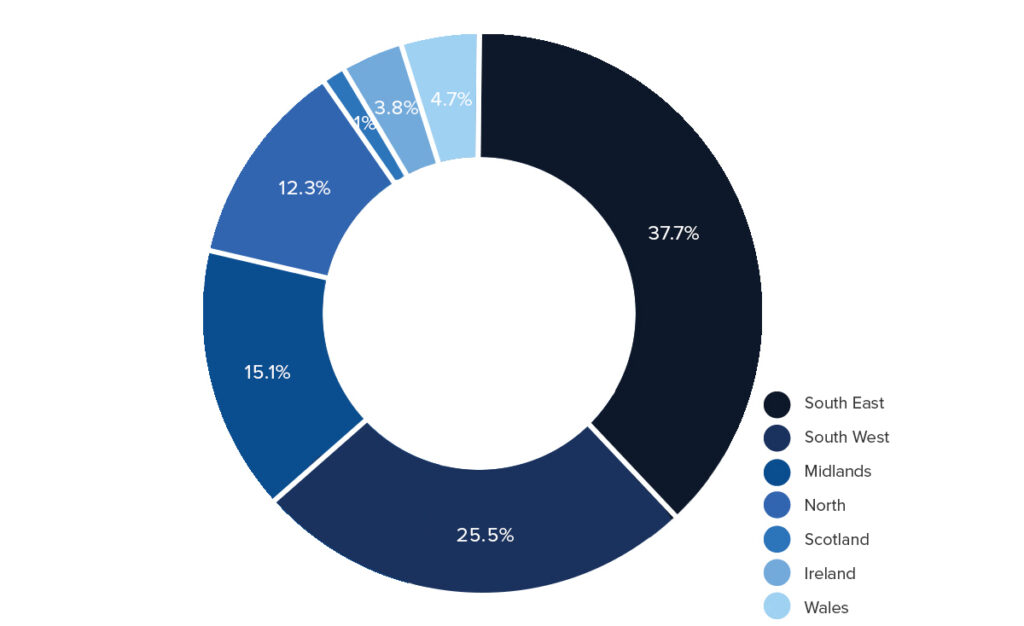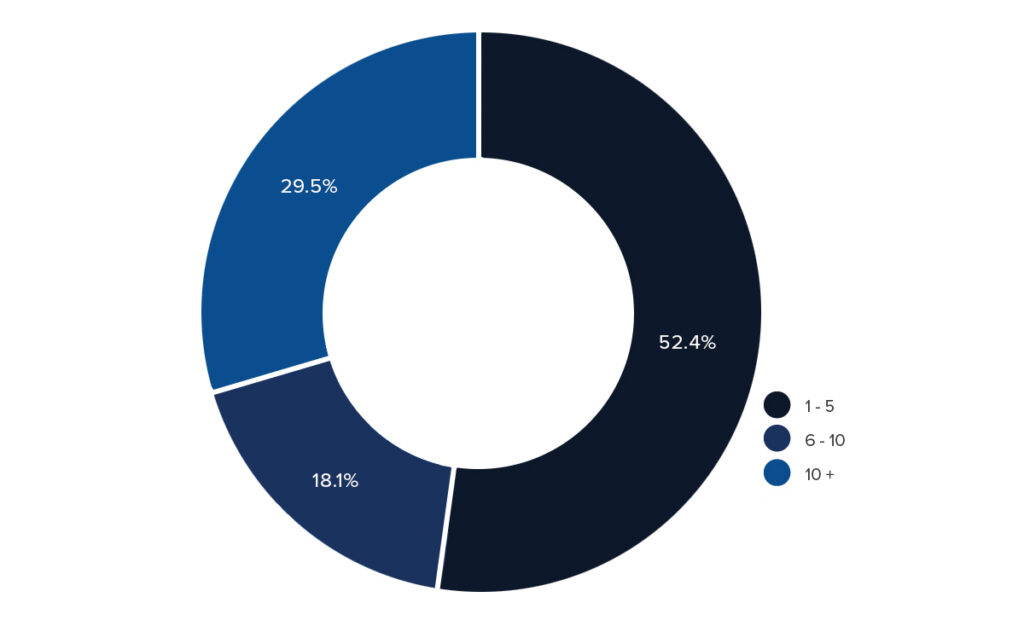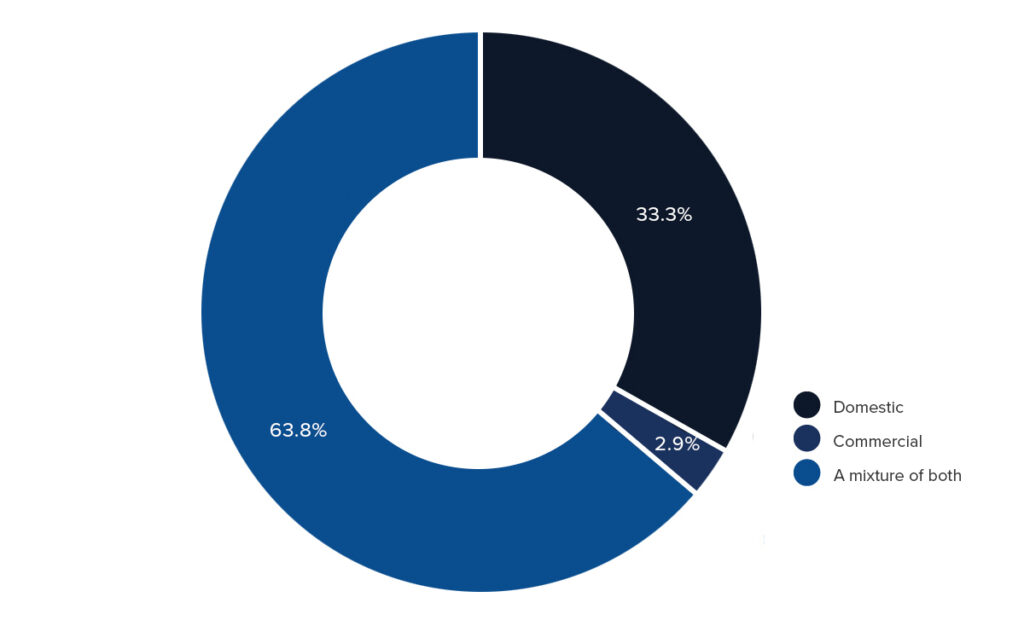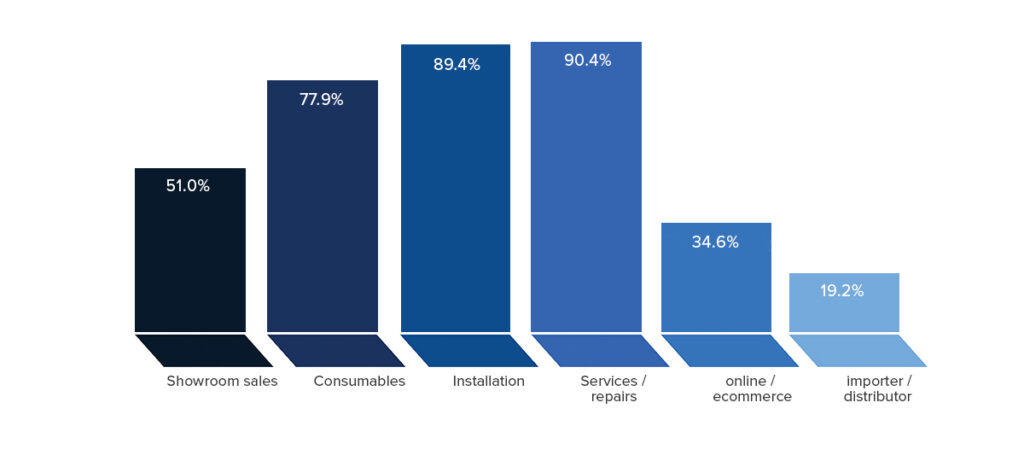The questions in this section are designed to show what sort of businesses answered the survey and they also give a good overall picture of the wet leisure industry.
Which region of the UK does your business operate from?
 The number of respondents based in the South East and South West has grown this year at the expense of Wales, the Midlands and particularly Scotland. It has been suggested that the south of the country has weathered the economic storm of COVID-19 more successfully than elsewhere and this may have been an influencing factor here.
The number of respondents based in the South East and South West has grown this year at the expense of Wales, the Midlands and particularly Scotland. It has been suggested that the south of the country has weathered the economic storm of COVID-19 more successfully than elsewhere and this may have been an influencing factor here.
How many employees do you have in your business?
 Last year the survey showed significant growth in the number of businesses that employed ten or more people. This year’s data shows very little change to that picture with these larger companies remaining at just under 30% of the sample. Businesses of this size share one particular challenge that has been a common complaint over the years.
Last year the survey showed significant growth in the number of businesses that employed ten or more people. This year’s data shows very little change to that picture with these larger companies remaining at just under 30% of the sample. Businesses of this size share one particular challenge that has been a common complaint over the years.
“Finding suitable staff for growth”
“Lack of skilled labour.”
“Staffing of skilled construction and maintenance personnel now social distancing limits one on one training.”
Last year, even though the sector had grown significantly, we urged caution in drawing conclusions from a single year’s figures but now perhaps we can say that the growth in larger businesses is here to stay.
Which sectors of the wet leisure industry do you serve? Please check all that apply.
 Pools and spas have taken it in turns to hold the top slot for the last four years. This year pools inch ahead by 5%.
Pools and spas have taken it in turns to hold the top slot for the last four years. This year pools inch ahead by 5%.
“With more people at home the pool became very important, mostly to keep the kids out of the house.”
However it is surprising to see spas in the number two position as there was a great deal of talk during the summer about explosive growth in the spa and hot tub market. Perhaps the picture will become clearer when we examine it in more depth later in this report.
“COVID-19 has had a positive influence on our business. Stay at home Brits spending on the home, pools and spas.”
Respondents active in the sauna sector grew to almost 45% while the ‘other’ tick box was dominated by businesses who were installing steam, either steam rooms or steam showers.
‘Wellness suites and steam.”
Are your customers and clients domestic, commercial or a mixture of both?
 Looking back through the years of the Wet Leisure Survey we can see that serving a mixture of both the domestic and commercial markets was a trend that took off in 2011/2012 and has stayed with the industry ever since.
Looking back through the years of the Wet Leisure Survey we can see that serving a mixture of both the domestic and commercial markets was a trend that took off in 2011/2012 and has stayed with the industry ever since.
The increase was dramatic – from 21% to 61% in that one year – and is an example of how the Survey can flag up changes in the market that become important trends.
The factors that influenced Wet Leisure businesses to embrace work from both market sectors appears to have been the beginnings of an up-swing in health spas and spa hotels – the popularity of saunas and spas in holiday rental properties was still some way off – and an economy emerging slowly from a recession and keen to take work wherever it was offered.
What are the services that you offer your customers? Check all that apply.
 There is a dip in showroom sales this year. Is that an effect of the pandemic and lockdowns? Certainly the considerable increase in ecommerce, from 25.5% to 34.6%, would reflect the growth in online sales that has been seen throughout the economy.
There is a dip in showroom sales this year. Is that an effect of the pandemic and lockdowns? Certainly the considerable increase in ecommerce, from 25.5% to 34.6%, would reflect the growth in online sales that has been seen throughout the economy.
“The purchasing decisions for the usual consumables – covers, chemicals and maintenance – are switching to on-line. However, there are enough specialist elements to owning a pool that allows businesses to persist with their shops.”
Installation and maintenance run neck and neck. As the stock of pools and spas in the country grows, the opportunities for service contracts grow alongside them.
In summary.
The UK economy shrunk by roughly 11% in 2020 due to the impact of COVID-19, pushing the UK into its deepest recession on record. Leaving the EU, particularly the possibility of a ‘no deal Brexit’, grumbled on in the background but it was the pandemic and it’s resultant lockdowns and restrictions that spiralled the country into a social and economic crisis that wreaked havoc with firms and jobs. There were of course other factors at play.
